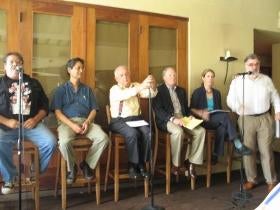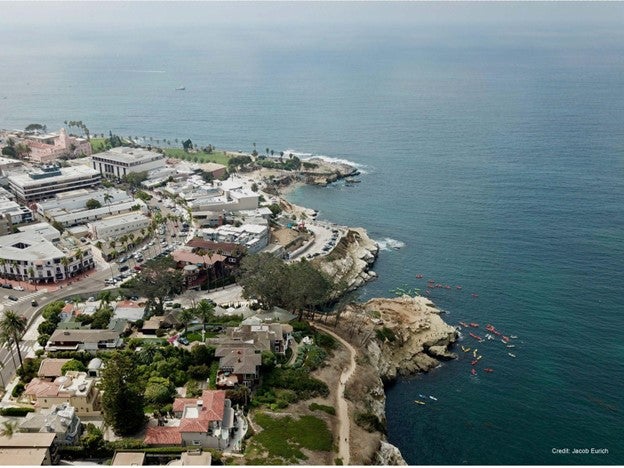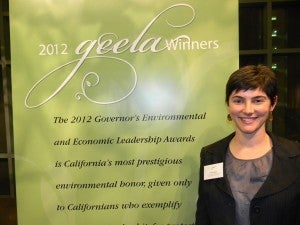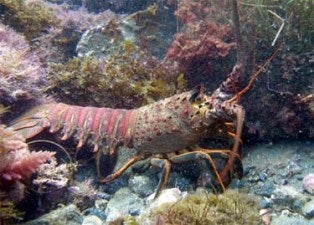Marine protected areas (MPA) are a conservation tool that sets aside part of the ocean to protect it for long-term conservation, similar to the way a state or national park functions on land. These MPAs are an effective way to preserve biodiversity by protecting ecosystems. But how are they utilized by people, and do they support human engagement? And, while conservation alone is important, will MPAs build climate resilience?
EDFish
Selected tag(s): California
Science to Action: a ten-year review of California’s MPA Network
Greenwire E&E: Loan program that supports Calif. fishing industry wins sustainability award
Reprinted from Greenwire with permission from Environment & Energy Publishing, LLC. www.eenews.net. 202-628-6500
Laura Petersen, E&E reporter
Published: Wednesday, January 23, 2013
A loan program dedicated to helping West Coast fisheries become more sustainable earned California’s top environmental honor.
The California Fisheries Fund received the Governor’s Environmental and Economic Leadership Award, which recognizes individuals, organizations and businesses for finding innovative ways to protect natural resources while also strengthening the economy.
“It fits perfectly into the kind of themes the governor has chosen to promote,” said Jim Marxen, a spokesman for the California Environmental Protection Agency, which handed out 17 awards last night. “Good environmental practices and a healthy economy must live together, and really this project is an epitome of that.”
The $4 million fund, which began in 2008 with support from the state and foundations, provides loans to fishermen, processors and distributors to finance upgrades that result in more sustainable practices.For example, fisherman Steve Fitz recently received a loan to purchase his uncle’s boat and continue the family tradition of using Scottish seine fishing gear, which herds ground fish into light nets that are far gentler on the surrounding habitat and reduces bycatch of other marine life.
“Money isn’t that readily available to borrow in our industry,” said Fitz, who works in Half Moon Bay. “Having access to the fisheries fund … allowed it to become a reality. Here I am, a new vessel owner.”
The fund, which is administered by the Environmental Defense Fund, has distributed $1.7 million to 11 recipients to date. Read More
EDF Wins Governor’s Environmental and Economic Leadership Award for California Fisheries Fund
Environmental Defense Fund was awarded California’s highest environmental honor by Governor Jerry Brown at a ceremony last night for our creation of the California Fisheries Fund (CFF). The CFF, the first fisheries-specific loan fund in California and most comprehensive in the United States, provides capital to fishermen, fishing businesses and communities who are dedicated to safeguarding the environment, their fishery’s profitability and the greater oceans economy.
The award ceremony was hosted by California EPA in Sacramento, California. During his remarks, California EPA secretary Matthew Rodriguez said that the “entities that we’re recognizing tonight are really showing us the way forward. Their unique approach shows how, given a challenge, California businesses, nonprofit organizations and businesses can really rise to the occasion.”
There can be many business challenges for fishermen to transition to more environmentally-friendly fishing practices but with the California Fisheries Fund, we’re removing roadblocks and helping fishermen continue on the path to fishing sustainably and profitably.
So far, we have awarded fourteen loans totaling nearly $1.7 million to eleven borrowers including fishermen, fishing businesses and communities. Most recently, we closed a loan to Steve Fitz, a Half Moon Bay fisherman who attended the award ceremony with us.. Steve’s CFF loan allowed him to buy his boat from his uncle and carry on his family’s sustainable fishing legacy—operating the only commercial fishing operation in the nation that uses Scottish Seine gear. The most eco-friendly way to catch flatfish like Petrale sole and sand dabs, Scottish Seine gear consists of lines which gently guide fish into the path of light-weight nets. Unlike some other types of fishing techniques, Scottish Seine doesn’t use heavy gear that drags along the ocean floor. Read More
‘Finding the Ways that Work’ in California Fisheries
By Guest Blogger, Huff McGonigal, fisheries consultant to EDF and the lead on our California fisheries projects with the spiny lobster fishery.
For the last 10 years, California has been working to create one of the most extensive networks of Marine Protected Areas (MPAs) in the world. When it’s complete later this year, this network will help protect California marine ecosystem for generations to come. But while MPAs will form a cornerstone for marine management in the state, simply closing these areas to fishing will not ensure sustainable fisheries off California. Healthy fisheries, and the communities and jobs that depend on them, require that focus now be shifted to effective management of the 84% of state waters that remain outside the MPA network.
The challenge in California, as in many states, is the persistent lack of agency resources available to move fisheries management forward in a meaningful way. This is exacerbated by a progressive law in California called the Marine Life Management Act that requires that fisheries be managed under Fishery Management Plans (FMPs). While the law’s concept of holistic management is a good one, the expense of creating these plans has largely kept them from being developed and management regimes have therefore remained stuck.
In 2008 EDF was approached by leaders of the spiny lobster fishery who were seeking to better control their fishing effort in order to maintain the fishery’s sustainability and economic viability. There was concern in the fishery that every year there was increasing pressure for fishermen to use more and more traps in order to compete for lobster and for fishing grounds. Further, as fishing grounds are lost to MPAs, fishing will be squeezed into an even smaller area, making these problems more acute. However, the requirement that change be carried out through a FMP presented a major obstacle. The state’s budget problems were worse than ever and the traditional approach, where the Department of Fish and Game (DFG) develops the FMP internally, was not possible. DFG and the fishery both agreed to try a new approach where DFG retained oversight of the process but where the majority of development would be carried out by contracted, outside expertise. EDF worked hand in hand with industry, DFG, and other partners to develop a budget and a broadly supported grant proposal to the Ocean Protection Council to secure the funding necessary to make this new model a reality.
After an extensive peer review, the Ocean Protection Council funded the full request amount of $990,000. In doing so it formally opened a new avenue for new fisheries management tools and approaches in California. Not only will this allow the lobster fishery to adjust to the new MPA network, but it represents a scalable model where national and international expertise can be directly engaged in FMP development and for a third of the cost of traditional FMPs.
There is now a pathway in California for coupling and integrating the MPA network with thoughtful, strategic management of fisheries – where closed areas are complemented by well managed open areas, and vice versa. To do this successfully will establish California as a true leader in ocean governance, and in the end, this is what it will take to ensure a healthy ecosystem, sustainable fisheries, and strong fishing communities.
Restaurants and Community Working for Sustainable Fisheries Policy
 It isn’t often that a neighborhood restaurant wades into complex policy discussions about fisheries management, so kudos to Bob Klein of the traditional Italian restaurant Oliveto’s in Oakland for hosting a Fisheries Forum on Saturday. The restaurant not only serves delicious, sustainable seafood – it’s also willing to go the extra mile to help educate its customers and the wider community of the importance, challenges, and opportunities of fisheries management.
It isn’t often that a neighborhood restaurant wades into complex policy discussions about fisheries management, so kudos to Bob Klein of the traditional Italian restaurant Oliveto’s in Oakland for hosting a Fisheries Forum on Saturday. The restaurant not only serves delicious, sustainable seafood – it’s also willing to go the extra mile to help educate its customers and the wider community of the importance, challenges, and opportunities of fisheries management.
EDF’s marine ecologist Rod Fujita and Pacific Ocean program director Johanna Thomas were invited to be panel participants, along with Erika Feller of The Nature Conservancy, Zeke Grader of the Pacific Coast Federation of Fishermen’s Associations and Larry Collins, a crab fisherman from the San Francisco Bay Area. The panel was moderated by Ed Ueber, a former manager of the Cordell Bank Marine Sanctuary.
About 30 people showed up at Oliveto’s to learn about the potential of catch share programs – like the recently approved West Coast groundfish IFQ — and community fishing associations – like the innovative Cape Cod Hook Association — to improve the economics and sustainability of fishing along the Pacific coast. Following the panel discussion, participants were treated to an amazing Italian Riviera-style fisherman’s stew comprised of all local fish-rockfish, squid, and clams – with wild fennel pollen, saffron, and olives.
Bravo to Oliveto’s and all the participants for their commitment to providing fresh, local, delicious and sustainable seafood from the Bay Area and the California Coast. Hopefully the good meal and good discussions were the beginning of a fresh dialogue, as we all have a stake in preserving California’s rich fishing communities.












